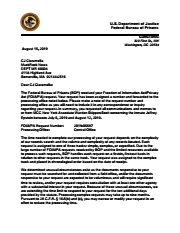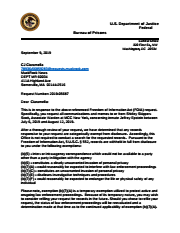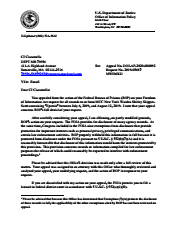MCC New York Warden Comms re: Epstein
| Tracking # |
2019-05687, DOJ-AP-2020-000092 2019-05687 |
| Submitted | Aug. 13, 2019 |
MuckRock users can file, duplicate, track, and share public records requests like this one. Learn more.
Communications
From: CJ Ciaramella
To Whom It May Concern:
Pursuant to the Freedom of Information Act, I hereby request the following records:
- All communications and memos to or from MCC New York Warden Shirley Skipper-Scott containing "Epstein" between July 6, 2019 and August 12, 2019.
For the purposes of this request, this includes records concerning government business on private or non-public email addresses, as well as text messages. Please include the full email chain in which the search term appears.
The requested documents will be made available to the general public, and this request is not being made for commercial purposes.
In the event that there are fees, I would be grateful if you would inform me of the total charges in advance of fulfilling my request. I would prefer the request filled electronically, by e-mail attachment if available or CD-ROM if not.
Thank you in advance for your anticipated cooperation in this matter. I look forward to receiving your response to this request within 20 business days, as the statute requires.
Sincerely,
CJ Ciaramella
From: Bureau of Prisons
Good morning,
Please see the attached letter.
Regards,
T. Allen
-

attachment-1
From: Bureau of Prisons
Good afternoon,
Attached, pleasefind correspondence from the Bureau of Prisons regarding your FOIA RequestNumber 2019-05687.
Sincerely,
Kara Christenson
Sr. GovernmentInformation Specialist
Federal Bureau ofPrisons
Office of GeneralCounsel
FOIA/Privacy ActSection
From: CJ Ciaramella
To whom it may concern:
This is a Freedom of Information Act appeal regarding FOIA request No. 2019-05687.
I. The Request
On Aug. 13, 2019, Reason Magazine reporter C.J. Ciaramella submitted a FOIA request to the Bureau of Prisons (hereafter “BOP”) seeking “All communications and memos to or from MCC New York Warden Shirley Skipper-Scott containing 'Epstein' between July 6, 2019 and August 12, 2019.”
The request was received and assigned tracking number 2019-05687. On Sep. 9, 2019, the Department issued a final response, categorically denying the request under the following exemptions:
(b)(5) - inter- or intra-agency correspondence which would not be available to a party
other than a party in litigation with the agency
(b)(6) - constitutes a clearly unwarranted invasion of personal privacy
(b)(7)(A) - could reasonably be expected to interfere with law enforcement proceedings
(b)(7)(C) - constitutes an unwarranted invasion of personal privacy
(b)(7)(E) - discloses investigative techniques and procedures
(b)(7)(F) - could reasonably be expected to endanger the life or physical safety of any
individual
II. The argument
A. BOP failed to conduct a required search for records.
BOP states that it “determined that any records responsive to your request are categorically exempt from disclosure. Accordingly, this Office is not required to conduct a search for the requested records.”
BOP’s failure to conduct any search for records or justify the exemptions it invoked, beyond merely reciting their names and statutory standards, frustrates any attempt to determine how it arrived at its conclusions. However, a categorical refusal to search for the records under Exemption 7(C) is only appropriate if, in balancing privacy interests against the public interest, “the balance characteristically tips” toward nondisclosure. U.S. Dep’t of Justice v. Reporters Comm. for Freedom of the Press, 489 U.S. 749, 776 (1989).
As a general rule, an agency must “demonstrate beyond material doubt that its search was reasonably calculated to uncover all relevant documents.” Valencia-Lucena v. United States Coast Guard, FOIA/PA Records Mgmt., 180 F.3d 321, 325 (D.C. Cir. 1999).
The records in question are email communications and memos, which are commonly released to FOIA requesters by agencies with partial or full redactions when material is exempt. It is impossible for BOP to conclude that all responsive records returned by a keyword search of a public official’s email account would be categorically exempt without performing a search in the first place. In any case, the unspecified privacy and law enforcement interests cited by BOP do not outweigh the significant public interest in the release of these records, as will be argued below, and in any instances where privacy interests or other exemptions prevail, such information can be redacted or withheld while non-exempt information, such as email metadata, is released to the requester.
B. BOP is required to produce any “reasonably segregable” portions of withheld records.
BOP is required by law under 5 U.S.C. § 552(b) to produce any “reasonably segregable” portion of the records being withheld. In this case, the BOP did not perform any segregability analysis, because it failed to perform a search for responsive records.
When an agency claims it is unable to segregate documents, it must “describe what proportion of the information in a [withheld] document is non-exempt and how that material is dispersed throughout the document.” Mead Data Cent., Inc., v. U.S. Dep’t of Air Force, 566 F.2d 242, 260 (D.C. Cir. 1977. The duty to segregate ensures that agencies are not allowed to issue “sweeping, generalized claims of exemption for documents” (Id), which is exactly what happened here. Instead, agencies must describe which passages in a document have been withheld, and under which exemption. Schiller v. NLRB, 964 F.2d 1205, 1209 (D.C. Cir. 1992).
To the extent that any responsive records contain information that is exempt, this information should be redacted and the remainder of the text produced. For example, the responsive documents would contain purely factual information such as email metadata, dates, and names of public officials.
C. BOP has not satisfied its burden of demonstrating that the responsive documents are exempt from disclosure under Exemption 5.
BOP cites Exemption 5 but does not specify any of the specific privileges that are incorporated into the Exemption, such as the deliberative process privilege.
To qualify for FOIA’s deliberative process privilege, an agency must demonstrate, not simply declare, that the withheld documents are both “pre-decisional” and “deliberative.” Judicial Watch, Inc. v. FDA, 449 F.3d 141, 151 (D.C. Cir. 2006). A document is pre-decisional if it was “generated before the adoption of an agency policy” and deliberative if it reflects the “give-and-take of the consultative process.” Id. The privilege does not protect material that is “purely factual” or “an agency’s final opinions, statements or policy and interpretations definitively adopted by the agency, and any document having ‘the force and effect of law.’” Nat’l Wildlife Fed’n v. U.S. Forest Serv., 861 F.2d 1114, 1122 (9th Cir. 1988). Furthermore, records are “deliberative” only when they “reflect the personal opinions of the writer rather than the policy of the agency.” Morley v. CIA, 508 F.3d 1127 (D.C. Cir. 2007).
An agency seeking to invoke FOIA’s deliberative process exemption must establish “what deliberative process is involved, and the role played by the documents in issue in the course of that process.” Coastal States Gas Corp. v. Dep’t of Energy, 617 F.2d 854, 867 (D.C. Cir. 1980).
However, BOP makes no effort to satisfy its burden of proof that the responsive documents fall under the exemption. An agency invoking Exemption 5 is required to “show, by specific and detailed proof, that disclosure would defeat, rather than further, the purposes of FOIA.” Mead Data Cent., Inc. v. U.S. Dep’t of Air Force, 556 F.2d 242, 251 (D.C. Cir. 1977).
D. BOP failed to demonstrate that the responsive documents are exempt from disclosure under Exemption 6 and Exemption 7(C).
BOP cited Exemptions 6 and 7(C). The D.C. Circuit has noted that “the privacy inquiries of Exemptions 6 and 7(C) are essentially the same.” Judicial Watch, Inc. v. Dep’t of Justice, 365 F.3d 1108, 1125 (D.C. Cir. 2004).
Under the balancing test established in Nat’l Archives & Records Admin. v. Favish, 541 U.S. 174 (2004), a requester seeking to overcome Exemption 7(C)’s privacy protections and alleging government misconduct must “produce evidence that would warrant a belief by a reasonable person that the alleged Government impropriety might have occurred.”
In this specific instance, it is indisputable that there was a government failure in a case of intense public interest. Jeffrey Epstein, a high-profile criminal defendant who had already attempted to commit suicide once, was found dead in his cell at MCC New York, a federal jail. Epstein’s death was covered by national media outlets, including The New York Times, which reported two guards did not check on Epstein for three hours and then falsified records to cover it up: https://www.nytimes.com/2019/08/13/nyregion/jeffrey-epstein-jail-officers.html
U.S. Attorney General William Barr also stated that there were “serious irregularities” uncovered at MCC New York in the wake of Epstein’s death: https://www.buzzfeednews.com/article/ellievhall/epstein-serious-irregularities-jail-william-barr
The relevant public interest in the release of these records is not necessarily what it reveals about Epstein, but what it reveals about how staff and leadership at MCC New York handled Epstein’s incarceration, how they allowed an infamous inmate to die under their watch before he could be tried in court, and how MCC New York and BOP leadership responded to Epstein’s death. “[T]he only relevant public interest in the FOIA balancing analysis [is] the extent to which disclosure of the information sought would ‘she[d] light on an agency's performance of its statutory duties' or otherwise let citizens know ‘what their government is up to.’ ” Dep't of Def. v. FLRA, 510 U.S. 487, 497, 114 S.Ct. 1006, 127 L.Ed.2d 325 (1994).
BOP did not articulate exactly whose privacy interests are at stake, but in Epstein’s case, privacy interests are diminished when the third party in question is dead. Schrecker v. U.S. Dep’t of Justice, 349 F.3d 657, 661 (D.C. Cir. 2003). Government officials also have diminished privacy protections compared to private citizens.
As previously noted, categorical withholdings under 7(C) are only appropriate when the balancing test between private and public interest “characteristically tips” toward non-disclosure. Email communications are among the most commonly released FOIA records.
Millions of reasonable people believe the government was at best negligent in Epstein's death and at worst complicit, and they are closely following news outlets' coverage of the Epstein case. Because the requested records involve substantial allegations of misconduct by government officials and would shed light on BOP’s performance of its statutory duty, and because the requested records involve a deceased individual who has limited privacy interests, the public interest in the release of these records far outweighs Exemption 7(C)’s privacy protections. BOP has not met its burden to categorical withhold the requested records under Exemptions 6 and 7(C).
E. BOP has not satisfied its burden of demonstrating that the responsive documents are exempt from disclosure under Exemption 7(A).
An agency invoking Exemption 7(A) must demonstrate that the records “relate to any ongoing investigation or … would jeopardize any future law enforcement proceedings.” Nat’l Labor Relations Bd. v. Robbins Tire & Rubber Co., 437 U.S. 214, 235 (1978).
The government must make a greater showing of interference than a conclusory statement that “the withheld information was clearly related to (an ongoing investigation).” Campbell v. Dep’t of Health & Human Servs., 682 F.2d 256, 259 (D.C. Cir. 1982).
BOP has not demonstrated that the requested records either relate to an ongoing investigation or would jeopardize such an investigation. Therefore, BOP has not met its burden to apply Exemption 7(A).
F. BOP has not satisfied its burden of demonstrating that the responsive documents are exempt from disclosure under Exemption 7(E).
An agency seeking to withhold records under Exemption 7(E) must “logically” show how releasing the requested information would “create a risk of circumvention of the law.” Mayer Brown LLP v. IRS, 562 F.3d 1190, 1194 (D.C. Cir. 2009).
Furthermore, the D.C. Circuit has declared that the “near-verbatim recitation of the statutory standard is inadequate” and that “the agency must at least provide some explanation of what procedures are involved and how they would be disclosed.” Citizens for Responsibility & Ethics in Washington v. U.S. Department of Justice, 746 F.3d 1082, 1102 (D.C. Cir. 2014).
BOP failed to provide any explanation as to what procedures are at risk of being revealed or how the release of such records would create a risk of circumvention of law. BOP has failed to meet its burden to withhold the records under Exemption 7(E).
G. The BOP fails to meet its burden to invoke Exemption 7(F).
An agency invoking Exemption 7(F) must provide specific bases as to how releasing a record could endanger the life of a “small and specific group,” such as the “family members or coworkers of a named individual.” Am. Civil Liberties Union v. Dep’t of Def., 543 F.3d 59, 68, 80 (2d Cir. 2008).
The agency also bears the burden of identifying “the subject of the danger … with at least reasonable specificity”. Id, at 68, 71.
Again, BOP merely cited the exemption and failed to satisfy its burden to categorically exempt records under Exemption 7(F).
***
For the reasons above, the requester respectfully requests that the BOP perform the required search and segregability analysis, produce any documents responsive to this request, and respond to this appeal within 20 days. If you have any questions or concerns regarding this appeal, please contact me directly at 503-951-9863.
Sincerely, CJ Ciaramella
From: Bureau of Prisons
This message is to notify you of a new appeal submission to the FOIAonline application. Appeal information is as follows:
* Appeal Tracking Number: DOJ-AP-2020-000092
* Request Tracking Number: 2019-05687
* Requester Name: CJ Ciaramella
* Date Submitted: 10/02/2019
* Appeal Status: Submitted
* Description:
BOP Appeal
From: Bureau of Prisons
DOJ-AP-2020-000092 has been processed with the following final disposition: Affirmed on Appeal.
Given the nature of this request, some records are only being released to you as the requester. If you have an account in FOIAonline, you may access those records by [FOIAONLINE_HOME]. Otherwise, those responsive records will be sent via the method agreed upon with the FOIA processor.
From: Bureau of Prisons
Dear Requester Ciaramella -
I just received your email inquiry regarding the status of your FOIA Request No. 2019-05687. Our records indicate your request was responded to on September 9, 2019. I've attached another copy of the response. Please confirm your receipt of this email and attachment.
Sincerely,
Kara Christenson
Sr. Government Information Specialist
Files
pages



